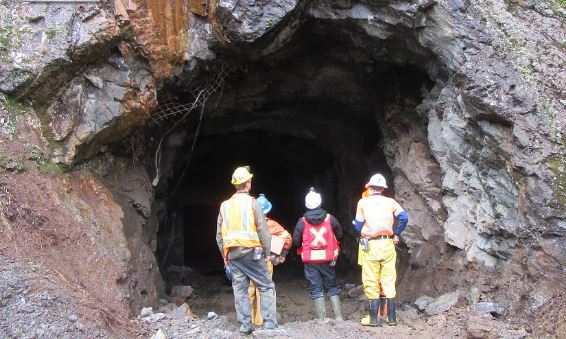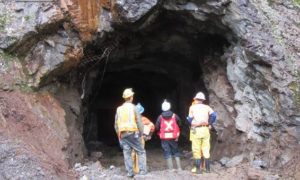Can Skeena’s Netolitzky do it again at Snip and Eskay Creek?

The past-producing Snip Mine's 440 Portal and technical crew in BC's Golden Triangle region. Source: Skeena Resources Ltd.
By Peter Kennedy

Skeena Resources Ltd. [SKE-TSXV] is gearing up for a big exploration program this year in a bid to revive two of Canada’s most successful high grade precious metal mines – Snip and Eskay Creek – both located in northwest British Columbia’s Golden Triangle region.
If the company succeeds, it will be yet another coup for Skeena Chairman Ron Netolitzky, who was involved in the discovery of the Eskay and Snip mines and was named Canadian prospector of the year back in 1990.
Skeena acquired a 100% interest in Snip on July 31, 2017 and signed an option to earn a 100% interest in Eskay Creek from Barrick Gold Corp. [ABX-TSX, ABX-NYSE] in December 2017.
“Eskay Creek was a remarkable discovery that became an extraordinary mine,” said Skeena CEO Water Coles. “It produced 3.3 million ounces of gold and 160 million ounces of silver from 2.2 million tonnes of ore from 1994 until closure in 2008,” he said.
Snip was also a high-grade mine that produced approximately 1 million ounces of gold from 1991 to 1999, at an average gold grade of 25 g/t at a 12 g/t reserve cut-off.
“Netolitzky always had a mind-set that there was a lot of material left behind that was sub-economic, at the time of mining, but which could be valuable today because of newer infrastructure and a higher price in gold,” said Kelly Earle, vice-president, communications at Skeena.
She was referring to a new power line as well as hydro-electric facilities which have been built in the area since the mines were closed. The former Snip mine was a former fly-in-fly out operation that was dependent on diesel fuel. Concentrates were transported from the site by hovercraft in the summer and by plane in the winter.
Skeena completed 7,180 metres of surface diamond drilling at Snip in 2016 and just wrapped up 8,650 metres of underground diamond drilling in December. Earle said recent drilling has focused on remnants of the Twin Zone, an area that accounted for 60% of Snip’s production.
“We want to find another Twin Zone on the mine site if we can,” said Earle, during a recent speech to the Metals Investor Forum in Vancouver.
In keeping with that plan, Skeena is committed to 20,000 metres of drilling to further define the TWIN zone and look for a potential footwall structure. On January 30, 2018, the company released the final 12 holes of a 62-hole program completed at Snip. The company said drilling on the eastern portion of the Upper Twin Zone continues to establish grade and geological continuity as shown by 2017 underground drill hole UG17-059. It intersected 8.06 g/t gold over 8.00 metres, including 14.88 g/t gold over 3.22 metres.
Drilling also focused on the 412 Zone, which represents a series of vertically-dipping extensional veins located in the footwall of the Twin Zone. Highlights include UG17-051, which intersected 44.10 g/t gold over 1.50 metres.
“A Phase 2 underground drill program is expected to commence in February that will focus on further defining the Twin, Upper Twin and 412 Zones as well as exploring the newly defined 200 Footwall targets,” the company said in a press release dated January 30, 2017.
Skeena is also planning an aggressive program at Eskay Creek, which ranked as highest grade gold mine in the world at the time that it was in production. It was also the world’s fifth highest grade silver producer.
“The decision to stop mining at Eskay Creek would have happened in 2005-2006 when the price of gold was around $500 an ounce,” Earle said.
The company is planning a 20,000-metre drill program in a bid to upgrade unclassified exploration potential into a measured and indicated resource. In keeping with all of these plans, Earle said Skeena will be announcing a financing in the next few weeks.
To earn the 100% interest in Eskay Creek, Skeena must spend $3.5 million on exploration prior to December 18, 2020, pay Barrick $10 million, and reimburse Barrick for reclamation expenses incurred during the option period up to a maximum of $7.7 million.
On Wednesday, Skeena shares rose 4% or $0.03 to 78 cents. The 52-week range is 95 cents and 40 cents.
